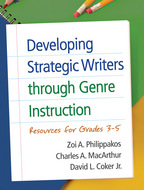Developing Strategic Writers through Genre Instruction
Resources for Grades 3-5
Zoi A. Philippakos, Charles A. MacArthur, and David L. Coker Jr.
Foreword by Steve Graham
A Paperback Originale-bookprint + e-book
A Paperback Original
orderMay 12, 2015
ISBN 9781462520329
Price: $41.00260 Pages
Size: 8" x 10½"
This highly practical guide offers a systematic approach to instruction in the three main writing genres—narrative, persuasive, and informative—that students in grades 3–5 are expected to master. Ready-to-use lesson plans and materials are grounded in research on strategy instruction and self-regulated learning, and connect with learning standards. Presented are ways to teach students strategies for planning, drafting, evaluating, revising, editing, and publishing writing in each genre, while making connections between reading and writing. Sixty-four reproducible planning forms and student handouts are provided; the large-size format facilitates photocopying. The Appendix contains a Study Guide to support professional learning. Purchasers also get access to a Web page where they can download and print the reproducible materials.
See also the authors' Developing Strategic Young Writers through Genre Instruction: Resources for Grades K–2.
See also the authors' Developing Strategic Young Writers through Genre Instruction: Resources for Grades K–2.
“A top-notch book that every third-, fourth-, and fifth-grade teacher will want. The book is organized as if the authors were taking teachers through a series of workshops that result in whole sets of lessons, including handouts and other needed materials. The focus on genre instruction and integration into content areas is terrific. This may be the most practical, hands-on, evidence-based guide for teachers I’ve ever seen! All principals should buy multiple copies for their teachers.”
—Jill Fitzgerald, PhD, Research Professor and Professor Emerita, University of North Carolina at Chapel Hill
“The CCSS call for students to be knowledgeable and resourceful writers. This book helps them become that, and more. All I had to do was follow the detailed lesson plans, which included engaging stories I used for instruction. Teaching my students strategies through genre instruction made a big difference. They learned how to set writing goals, use motivational strategies to monitor their progress, and reflect on their learning. They wanted to keep on writing!”
—Anna Yiantsos, MEd, third-grade teacher, Odyssey Charter School, Wilmington, Delaware
“Finally, and happily, we have a book that brings together self-regulated strategic writing and systematic, genre-based instruction. The book presents a lucid introduction to principles of strategy instruction for writing. It features detailed, classroom-tested lessons and materials in narrative, informational, and persuasive genres. The goal is to produce students capable of regulating their own writing processes—and the lessons and lesson-planning resources provided by the authors will help teachers achieve this goal. I kept thinking throughout that self-regulation is the key to meeting external educational demands, such as the CCSS.”
—James L. Collins, EdD, Graduate School of Education (Emeritus), University at Buffalo, The State University of New York
“What I love most about this book are the lesson plans that give teachers a clear progression for each of the Common Core genres. The writing samples provide excellent examples of where students should be heading. I also appreciate the emphasis on promoting self-regulated learning.”
—Lillian Fendell, MEd, third-grade teacher, Newark (Delaware) Charter School
Table of Contents
Foreword, Jill Fitzgerald
1. Writing Strategically: An Introduction to Genre-Based Strategy Instruction 
2. Principles of Genre-Based Strategy Instruction
3. Making It Work: The Instructional Sequence and Organization of the Lessons
4. Story Writing
5. Persuasive Writing
6. Compare–Contrast Writing
7. How to Plan Your Own Genre-Based Strategy Instruction Lessons
Appendix
Study Guide
About the Authors
Zoi A. Philippakos, PhD, is Associate Professor of Reading and Elementary Education in the College of Education at the University of North Carolina at Charlotte. Her research interests include reading and writing instruction for students in the elementary grades, strategy instruction and self-regulation, and approaches to professional development for classroom teachers. A former elementary school teacher and literacy coach, Dr. Philippakos is coauthor of Differentiated Literacy Instruction in Grades 4 and 5 and Effective Read-Alouds for Early Literacy.Charles A. MacArthur, PhD, is Professor Emeritus of Special Education and Literacy in the School of Education at the University of Delaware. A former special education teacher, Dr. MacArthur has been conducting research on writing development and instruction for struggling writers since the 1980s. Most recently, he was principal investigator on two grants to develop and examine the efficacy of a writing curriculum for college basic writing courses. Other research projects have focused on the development of a writing curriculum for students with learning disabilities, writing strategy instruction, decoding instruction in adult education, speech recognition as a writing accommodation, project-based learning in social studies in inclusive classrooms, and first-grade writing instruction. Dr. MacArthur is a Fellow of the American Educational Research Association and a recipient of a research award from the Council for Exceptional Children. He has served as coeditor of the Journal of Writing Research and the Journal of SpecialEducation, has published over 125 articles and book chapters, and is coeditor or coauthor of several books.
David L. Coker Jr., EdD, is Associate Professor in the School of Education at the University of Delaware. His research focuses on writing development, early writing assessment, and effective approaches to writing instruction. A former classroom teacher, Dr. Coker is coauthor of Teaching Beginning Writers and has published articles in leading journals of literacy, educational psychology, and learning disabilities.
